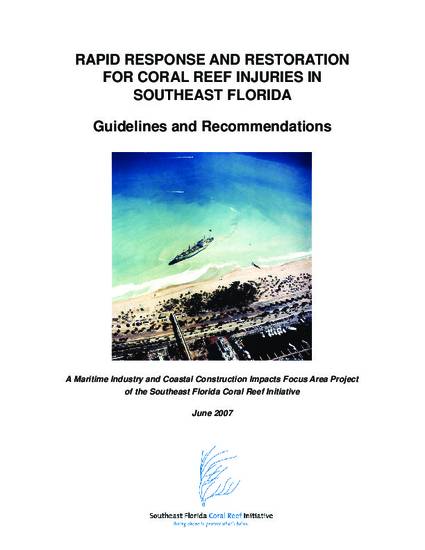
- Coral Reefs,
- Florida,
- Restoration,
- Conservation of Natural Resources
From the time an injury to coral reef resources is reported, a well-coordinated and implemented plan is critical to the success of response and restoration efforts. There are three major plan components, each of which is equally important: (1) the Initial Response period immediately following notification of the incident; (2) the Response period, during which the Responsible Party (RP) is identified, the Trustees and RP carry out their respective responsibilities, a Primary Restoration plan is developed, authorizations and contractors to conduct restoration activities are sought and obtained, and primary restoration activities are conducted; and (3) the Post-Response period, which is largely a monitoring, compensatory restoration/mitigation, and penalty assessment phase that takes place after primary restoration activities are carried out.
The guidelines and recommendations presented in this docuemnt were developed to examine reef injury response processes and to facilitate a rapid response to, and the successful restoration of, southeast Florida reefs. The document was developed as part of a Local Action Strategy (LAS) of the Southeast Florida Coral Reef Initiative (SEFCRI) to develop guidelines and recommendations for a rapid response and restoration process for reef injuries in the SEFCRI region.
In February 2006, a two day workshop was held in Fort Lauderdale, Florida, to compile information on existing emergency response processes, identify deficiencies and develop solutions for those processes, and compile information on existing technologies and procedures for triage and the restoration of reef injuries. The first day of the workshop focused on process and policy issues. The second day addressed response, injury and mitigation assessment, restoration and repair, and monitoring. Workshop panelists and attendees included respresentatives from local, state, and federal agencies with proprietary or regulatory authority or jurisdiction over sovereign submerged lands and reef resources located within Florida's waters. Also in attendance were technical and academic experts in the fields of coral reef research, injury assessment, and restoration, as well as marine contractors, private and public attorneys, nongovernmental organizations, and other interested parties. These guidelines and recommendations incorporate information from the combined experience of the workshop attendees, workshop outcomes, published documents, and numerous state and federal regulations, policies, and procedures.
